| | 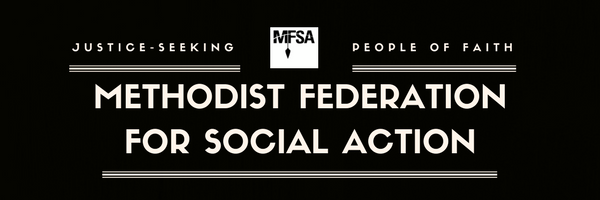 | | | Dear Justice-Seeker, This issue of MFSAVoices is jam-packed with resources and information. So much so that it won't all fit in your email message so be sure to click view entire message at the bottom of this email to view the entire issue. Our newsletters are designed to be used all month long. So take a quick glance and take note of important dates to add to your calendar but also come back in the following weeks to work your way through the action items. Gmail users—move us to your primary inbox - On your phone? Click the 3 dots at the top right corner, click "Move to" then "Primary"
- On your desktop? Back out of this email then drag and drop this email into the "Primary" tab near the top left of your screen
We continue to see the urgency of our work to make broad systemic change. Change that honors the dignity and worth of all people, puts people over money, and honors the earth and all her inhabitants. Since 1907, MFSA has been shining a light on injustice and organizing to change it. You make our collective work possible by your witness for justice every day in your church, community, and Annual Conference. MFSA does not receive any financial support from the United Methodist Church's giving channels. 100% of our budget is funded through your membership dues and your generosity in giving. | | | | | | 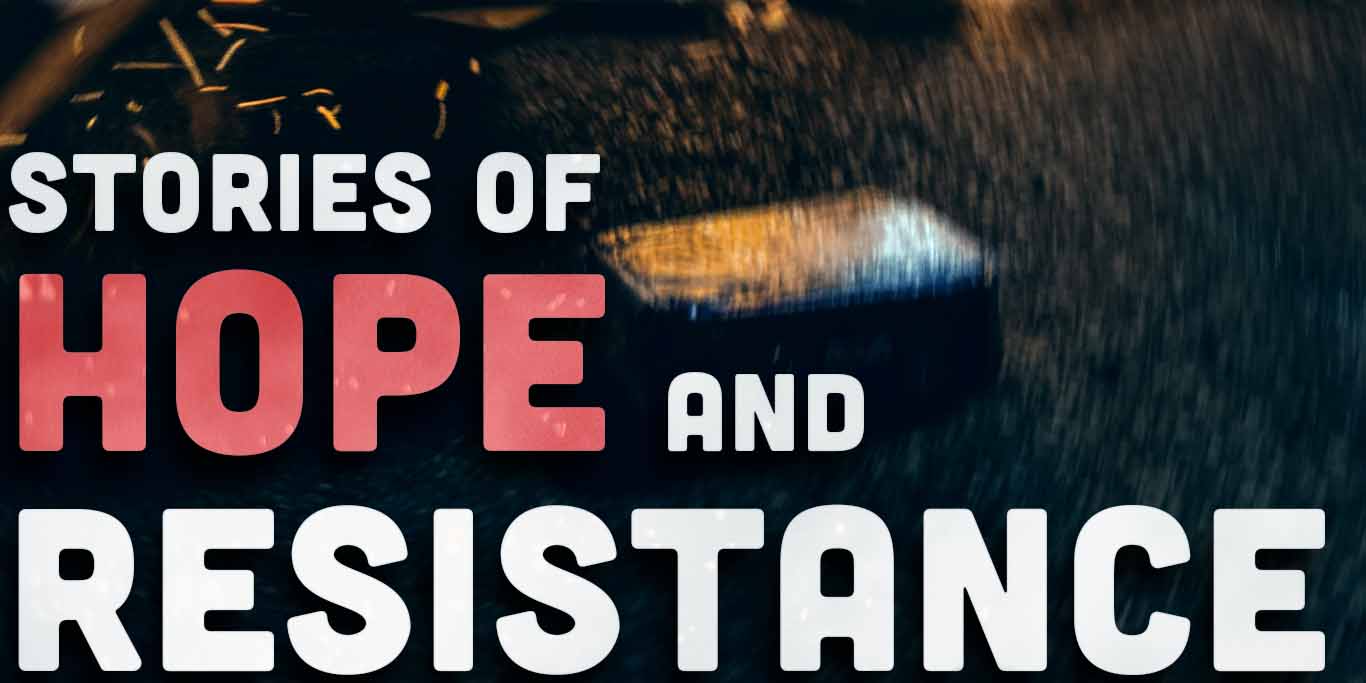 | Stories of Hope and Resistance The church has long been a place where justice is not only preached but lived out in times of political and social upheaval. However, with the arrival of a new administration intent on rolling back hard-won rights and freedoms, faith communities across the country are refusing to remain silent. This new section of our newsletter is dedicated to sharing the ways churches are standing firm in their commitment to justice. We're excited to highlight actions and movements within faith communities that resist oppression, embody radical hospitality, and insist on a future where love, dignity, and equity prevail. Whether through direct advocacy, sanctuary efforts, mutual aid, or prophetic witness, these faith communities remind us that another world is possible—and we are called to help create it. If your church is engaged in work that challenges injustice and fosters hope—especially through acts of subversion and resistance against oppressive policies—we want to hear from you. Here are some stories of hope and resistance: | | | | | | | | | | 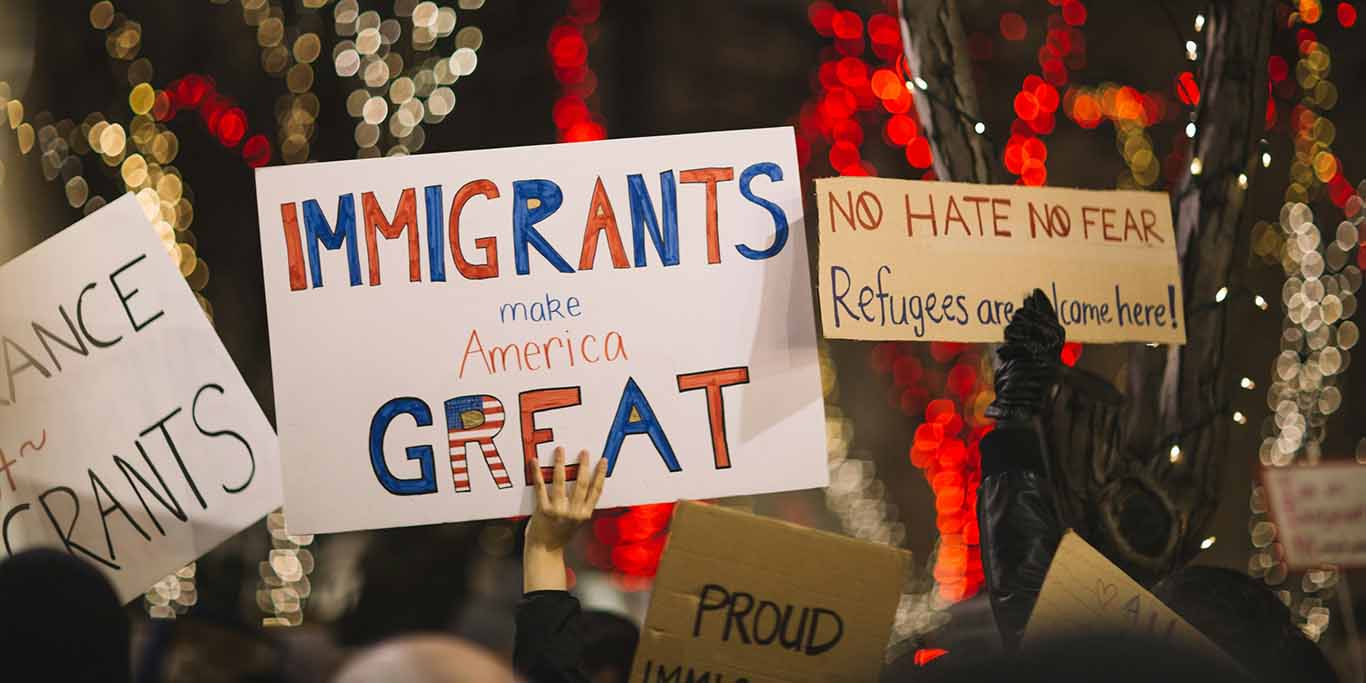 | Beyond Borders:
Centering Humanity in the Immigration Conversation Full webinar series now available to watch online. Presented by Methodist Federation for Social Action (MFSA), the Order of the Deaconess and Home Missioners (DHM), and the United Methodist Volunteers in Mission (UMVIM) Join us for the transformative webinar series, Beyond Borders: Centering Humanity in the Immigration Conversation—Stories, Struggles, and Solidarity Through powerful storytelling, expert insights, and action-oriented discussions, this series seeks to deepen our collective understanding of immigration and migration justice, equipping us to advocate for just policies and practices. Don't miss this opportunity to engage, learn, and stand in solidarity. | | | | Speakers for this webinar series include: Jeff Stewart is the Executive Director and Activist at the Immigration Worker Project. The Ohio Immigrant Worker Project (IWP) works with immigrant worker communities throughout Ohio, including helping them to build asylum cases for immigrant workers facing deportation. Pablo Delgado is the Executive Director of Open Arms. Open Arms welcomes, accompanies, and partners with Latino immigrants in building a safe and sustainable life. Deaconess Cindy Andrade Johnson is a humanitarian advocate who has worked with migrants. She lives with her husband, Mike Johnson, on the US/Mexican border in Brownsville, Texas. Her home Church is Travis Park United Methodist Church. Cindy is currently working as a consultant in the following areas: education, cultural competence, Migration, and Missiology | | | | | | 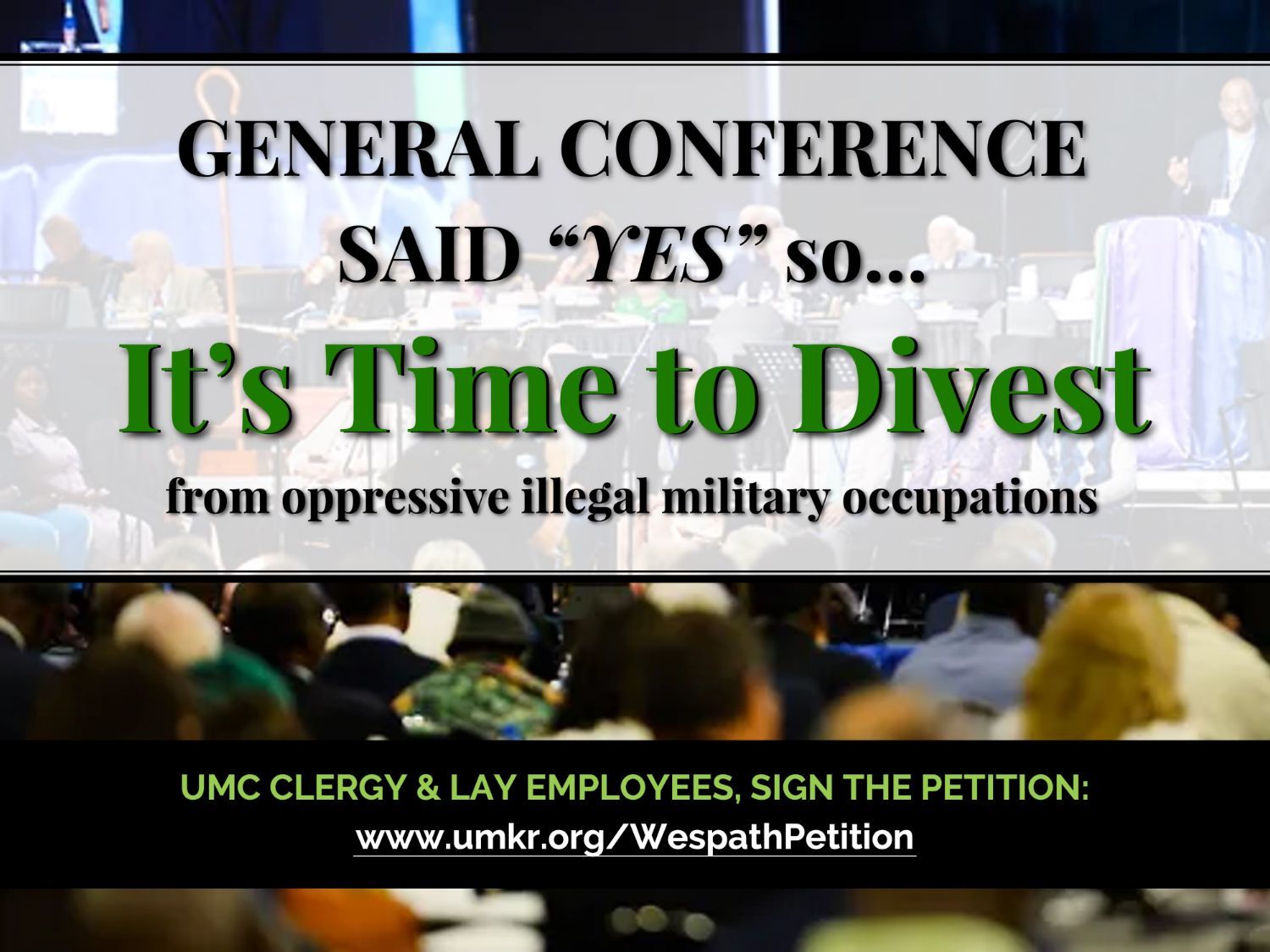 | UMKR has launched a petition asking Wespath to implement a resolution adopted by the General Conference in 2024. The resolution urges United Methodist investors not to invest in the bonds of countries maintaining prolonged illegal military occupations. | | "the General Conference prayerfully calls upon the boards and agencies throughout the connection and its own investment managers to add to their human rights guidelines explicit language with regard to governmental debt so as to exclude those governments maintaining a prolonged military occupation that have been the subject of United Nations Security Council resolutions and/or International Court of Justice rulings, and to align their portfolios accordingly, avoiding the governmental debt of each such country until the time when each government ends their military occupation." - from The Divestment Resolution adopted at the 2020/2024 General Conference. | | Our partners at United Methodist Kairos Response (UMKR) have launched a new petition urging Wespath to implement a key resolution adopted at the 2024 General Conference. The resolution calls for divestment from government debt issued by countries engaged in prolonged military occupations—specifically Israel, Turkey, and Morocco—until those occupations end. This is the first such divestment decision made by a major Christian denomination, and it reflects a clear moral stance against profiting from human rights violations. If you have a pension or retirement fund with Wespath, please sign this petition. | | | | | | | | 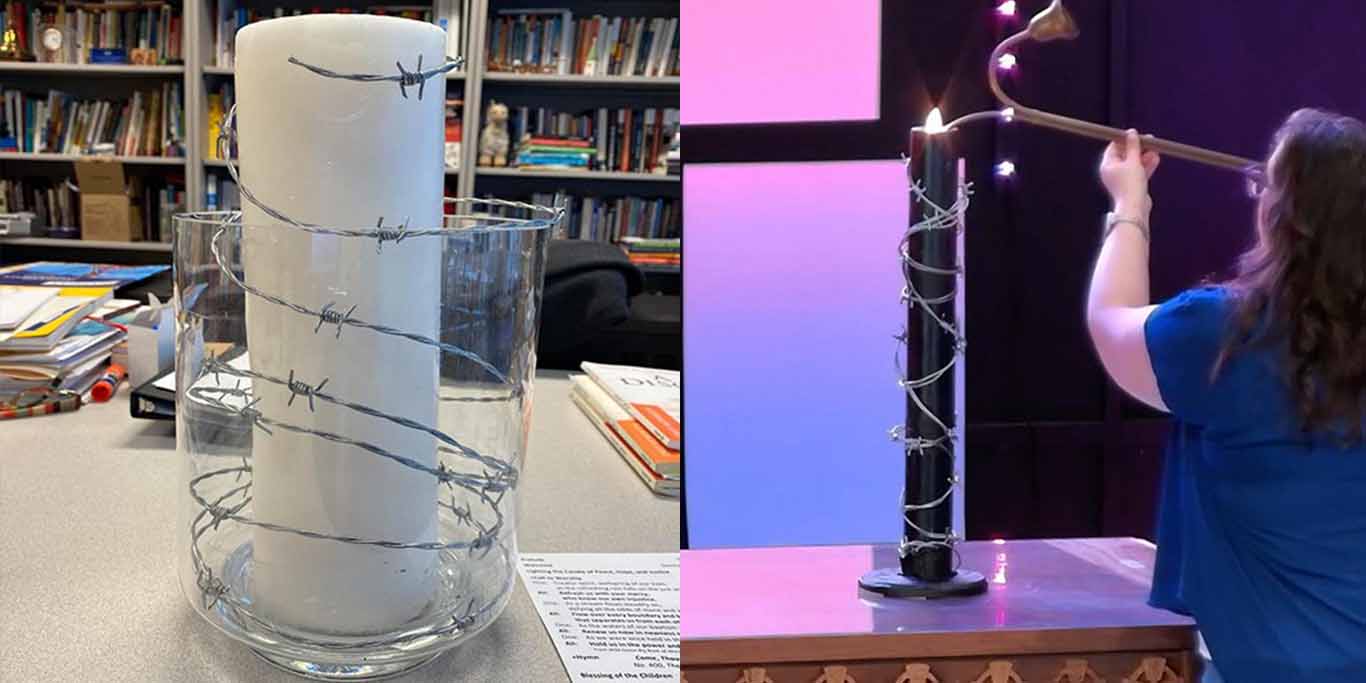 | Lighting the Candle of Peace, Hope, and Justice As we navigate the realities of this new administration, justice-seeking congregations across the country are standing in solidarity with those targeted by oppressive policies. We've seen churches respond by incorporating the Candle of Peace, Hope, and Justice into their worship services, lifting up prayers and commitments to resist injustice. Inspired by the Central Methodist Mission in Johannesburg, which lit a candle encircled in barbed wire during the struggle against apartheid, Rev. Dr. Donna Claycomb Sokol of Mount Vernon Place UMC in Washington, D.C., is one of the pastors who has reintroduced this practice. Rev. Andy Oliver of Allendale UMC in St. Petersburg, Florida, is another. Now, more than 50 congregations—including several MFSA-aligned churches—have joined this movement, lighting a candle each week and naming those suffering under policies of cruelty and exclusion. Recently, churches have lit the candle:
🕯️ For migrants—asylum seekers facing deportation, undocumented families living in fear, and faith leaders offering sanctuary.
🕯️ For federal workers—those losing their jobs, living in uncertainty, or suffering retaliation for speaking out.
🕯️ For USAID—millions impacted by halted humanitarian aid, from hungry children to struggling farmers.
🕯️ For the National Institutes of Health—patients, researchers, and those dependent on lifesaving medical advancements.
🕯️ For the conflict in Ukraine—those enduring war, Russian dissidents, and leaders seeking true peace.
🕯️ For the judicial branch—judges facing threats, courts upholding the rule of law, and those caught in legal battles over justice.
🕯️ For institutions of higher education and students—scholars facing retaliation, lost funding, and threats to free expression. Each time the candle is lit, congregations proclaim that the light shines in the darkness, and the darkness has never overcome the light. You can access the liturgy below. This document will be updated weekly, with liturgy uplifting a new group targeted by this administration. In this moment, as faith communities, we must recommit to resisting evil, injustice, and oppression in all its forms. Together, we will continue to bear witness, proclaim justice, and keep the light shining. | | | | | | | | 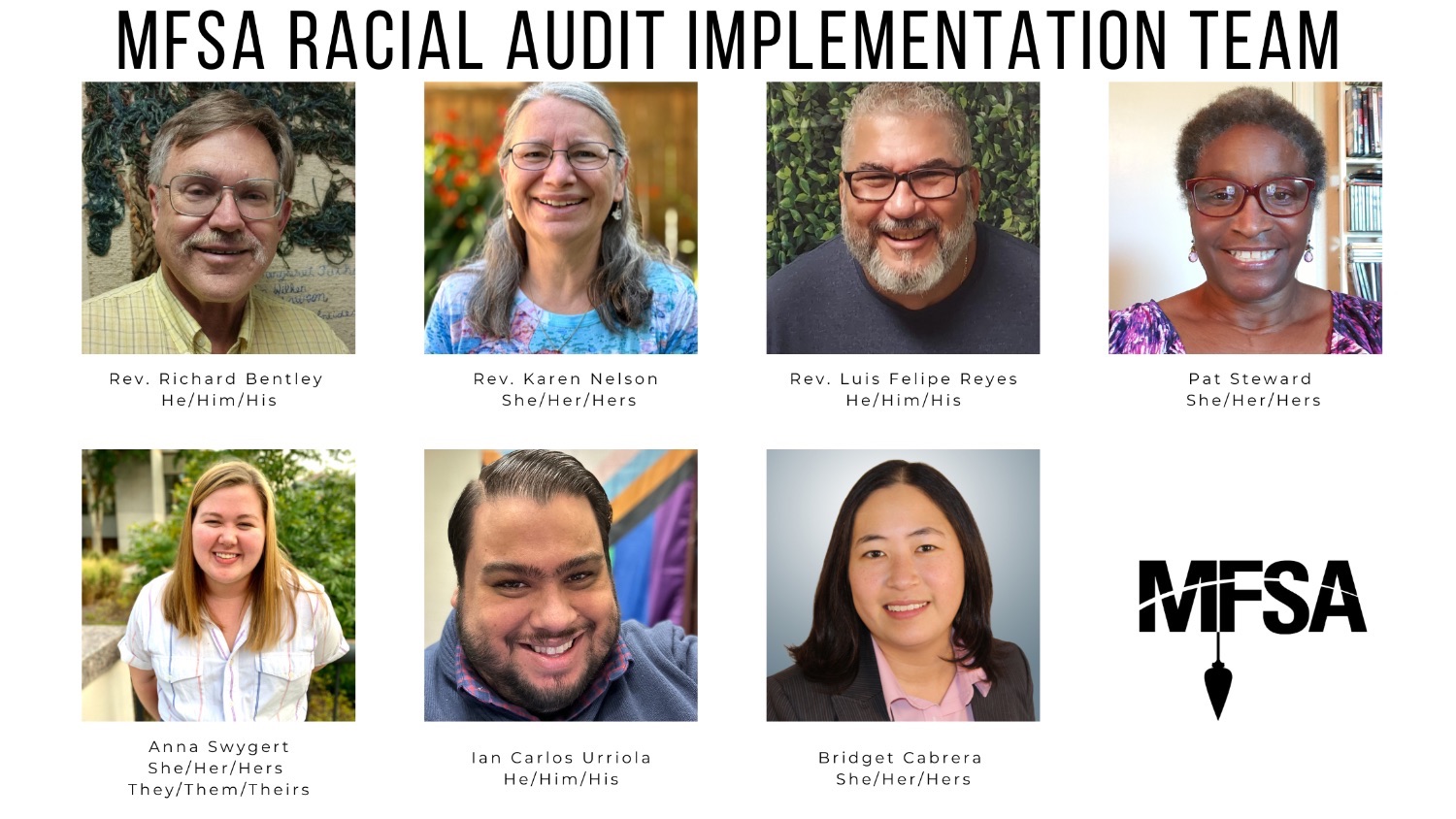 | Racial Audit Implementation Team Update Working Toward Justice by Rev. Luis F. Reyes-Rosario Note: In June 2023, the Methodist Federation for Social Action (MFSA) Board of Directors established the Racial Audit Implementation Team to enact the recommendations from the comprehensive Racial Audit, aiming to transform MFSA into an anti-racist organization. Rev. Luis is a member of that team. | | | As we embrace the journey of dismantling racism within the Methodist Federation for Social Action, it is clear that we have a monumental task ahead—not just in our conversations as the Racial Audit Implementation Team, but in confronting the ways our institutions, even with good intentions, have upheld the practices of the majority culture. For too long, the church has been silent and complicit in both subtle and overt forms of racism. People have left the church because it has boldly professed that all are created in the image of God (Genesis 1:27), yet remained silent in the face of injustice. We proclaim that there is no longer slave nor free (Galatians 3:28), yet we have been complacent in systems of oppression. To go in the opposite direction requires us to acknowledge and address years of institutional racism. Throughout American history, the church and slavery joined forces to promote a system of hierarchy and dominance. Economic, healthcare, criminal justice, education, housing, and banking systems were all designed to support slavery in the 17th century and continued these practices through the 18th, 19th, and 20th centuries. Our institutions were developed within these systems and, knowingly or not, perpetuate them. Power, Privilege, and Capital Power, in the context of community organizing, is the ability to act (Saul Alinsky), the strength required to bring about social, political, and economic change (Martin Luther King, Jr.), and something that concedes nothing without a demand (Frederick Douglass). This is what we should be working toward. However, our current reality is that power has become the ability to decide who has access to resources, to control the behavior of others, and to shape events to maintain existing systems of inequality. Privilege is the unearned access to resources available to some people simply because of their social group membership. As anti-racism activist Peggy McIntosh describes it: "Privilege exists when one group has something of value that is denied to others simply because of the groups they belong to, rather than because of anything they’ve done or failed to do. Access to privilege doesn’t determine one’s outcomes, but it is an asset that makes it more likely that whatever talent, ability, and aspirations a person with privilege has will result in something positive for them." White privilege, specifically, is both unconsciously enjoyed and consciously perpetuated. It is deeply embedded in American life. It is both a weightless knapsack and a weapon. Capital (Money) also plays a key role in systemic injustice. As Mahatma Gandhi said, “Poverty is the worst form of violence.” In 2023, the U.S. Department of Health and Human Services set the poverty guideline for a family of three at an annual income of $24,860, which equates to living on approximately $22.70 per person per day, including housing, food, clothing, utilities, etc. The basic necessities. Despite overall economic growth, poverty rates remain disproportionately high among certain racial and ethnic groups. In 2023, the poverty rates were: - Black Americans: 21.3%¹
- Latinos: 16.9%¹
- Non-Hispanic Whites: 8.7%²
These disparities are deeply rooted in historical marginalization and systemic barriers to quality education, employment opportunities, and equitable healthcare. The American Psychological Association notes that while non-Hispanic whites constitute the largest single group of Americans living in poverty, ethnic minority groups are disproportionately affected. These disparities are the result of historical marginalization and entrenched barriers to education and economic opportunities. The Work Ahead As we implement the Racial Audit, we must recognize that changing organizational behavior requires deep, collective repentance. If we want to be a relevant organization in a diverse society, this change is not just an aspiration—it is a necessity. The work before us may not be the change we originally envisioned, but it is the change required of us. As Dr. King reminded us, "Injustice anywhere is a threat to justice everywhere." We cannot move forward in faith without addressing the harm done and committing ourselves fully to the work of justice. True justice demands not just words but action. It means confronting our privileges, re-examining how we wield power, and using our resources to uplift those who have been marginalized. It requires that we—individually and collectively—choose the harder path of transformation rather than the easier path of complacency. —Rev. Luis F. Reyes-Rosario | | | | | | | | | | 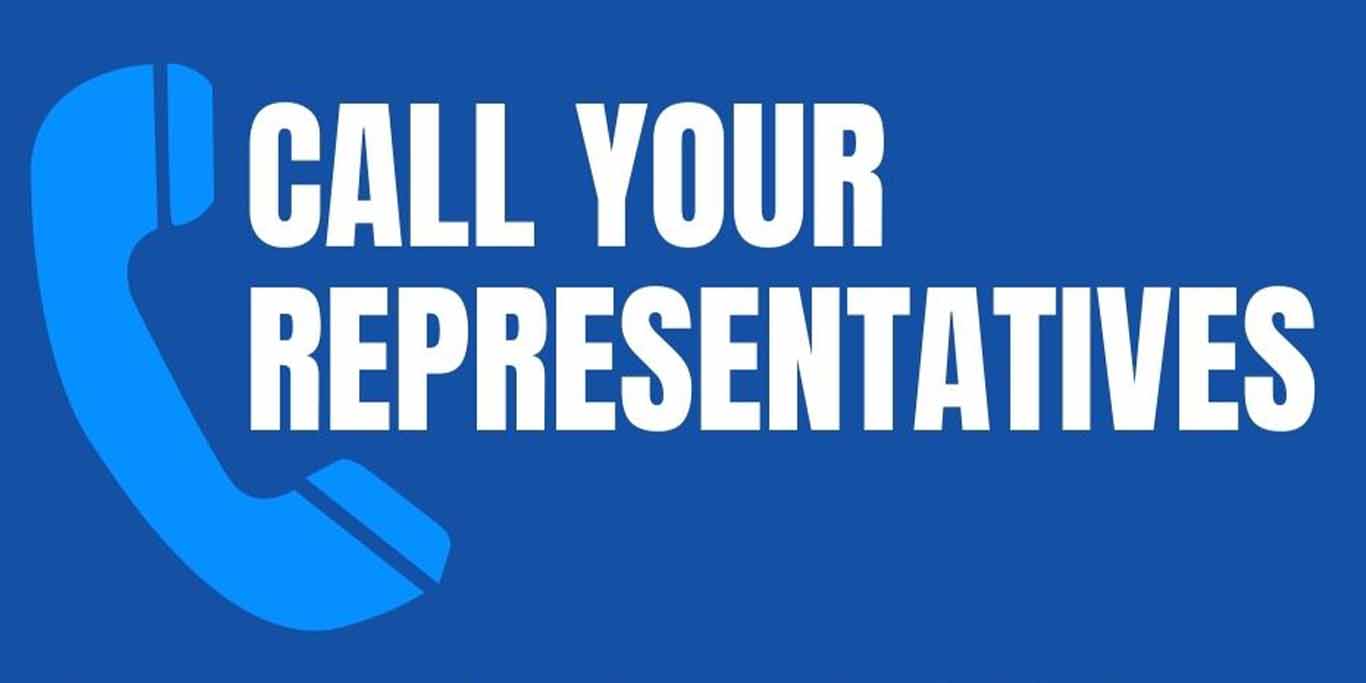 | Call Your Representatives and Demand Accountability We are reminded that respect for the office does not mean silence in the face of harm. Our democracy is under threat, and our most vulnerable communities are at risk. Now is the time to speak up—call your representatives and demand accountability. | | | | | | | |  | MFSA is now on Bluesky We've noticed many of our friends and partners making the move to this platform, and we're thrilled to join the conversation there. Stay connected with us for updates, advocacy, and conversations that matter. Connect with us @mfsavoices.org | | | | | | | | 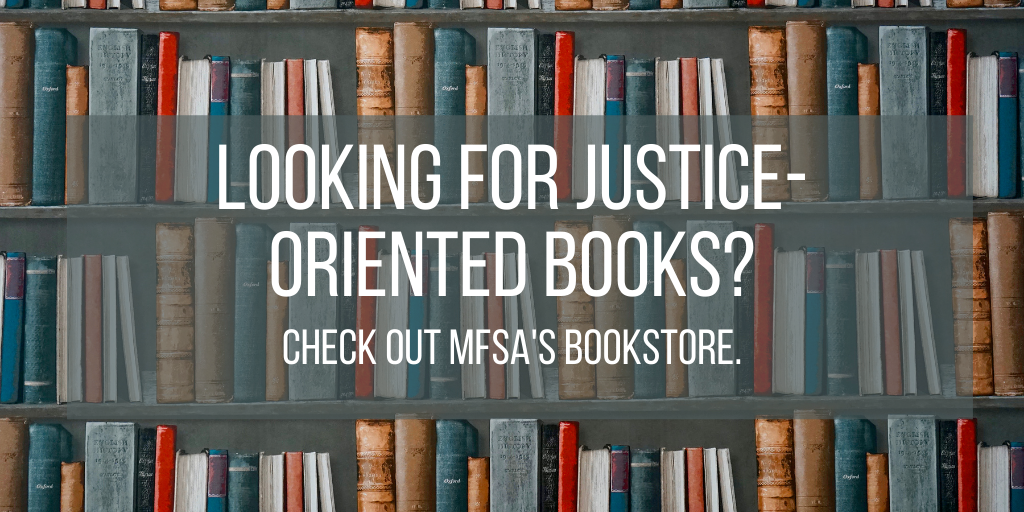 | | | | | | | | | | | | | 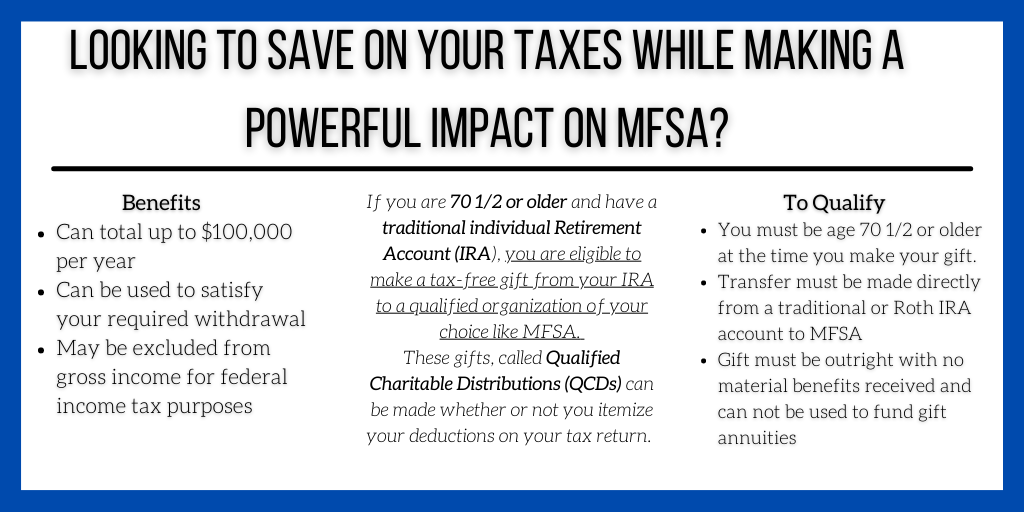 | | | | | | | | | Contact Us Methodist Federation for Social Action
996 Maine Ave SW #307
Washington, District of Columbia 20024
(202) 240-2546
bridget@mfsaweb.org | | | | | | | |